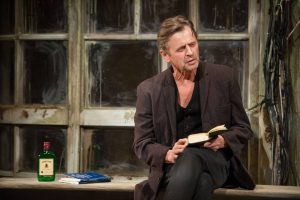

As a one-man show starring two men, Brodsky/Baryshnikov is a singular experience. Set on the poetry of Joseph Brodsky, performed by Mikhail Baryshnikov, and directed by Alvis Hermanis, the performance straddles the line between play and recital. It premiered March 9th at the Baryshnikov Arts Center.
Nearly twenty years after Mr. Brodksy's death, Mr. Baryshnikov, his close, if not best, friend, along with Mr. Hermanis, has conceived and produced an homage to the poet that touches the nerve of nostalgia in all of us. The scene opens on an antique vestibule made of glass; its paned doors are adorned with cherubs. A fuse box overflowing with electrical wires is mounted on the outside. Benches sit on either side of its entrance. Outside the glass house, sitting on one of the benches, Mr. Baryshnikov opens a suitcase and removes an alarm clock, a fifth of Jameson, and two books. He begins to read and recite Mr. Brodsky’s poetry.
The selection of Mr. Brodsky’s work used in the performance revolves almost completely around death and loss. The stanzas and verses layer to create the narrative of time's menacing. He contemplates life's undertone of death, like an alarm clock ticking away in the background, threatening to go off at any moment. Remembers a time when “lamp shades, fear, and the foxtrot” were all the rage. Aches for a reciprocal love from the country that exiled him.
Mr. Baryshnikov alternates between being inside and outside of the vestibule. Within the glass enclosure, the words are accompanied by interpretive movement without identity, whereas Mr. Baryshnikov’s time outside the glass is spent as a regular man, doing things like untying his shoes and putting on glasses. It is the pedestrian difference between being and seeing.

Mr. Baryshnikov moves like he always does: mindful, exact, stunningly simplistic. His body’s adaptability is exquisite; he moves effortlessly between delicate mime, abstract imitation of a butterfly, and a grotesque physicalization of the fear of dying. While not a dance piece, the element of movement plays an important role in Brodsky/Baryshnikov, giving life to Mr. Brodsky's words in a way that only a dear friend could. Mr. Baryshnikov brings the viewer through Mr. Brodsky’s words, and into the physicality that his poems elicit. Pain, fear, and heartache manifest themselves inside the realm of the mind’s continual repetition of the past.
Throughout the evening, Mr. Brodsky's presence glows alongside Mr. Baryshnikov's, and one could argue even overshadows it at points. The fuse box crackles and pops with poignancy. The poet's voice reads verses through an ancient tape recorder, adding to the depth of the evening.
One of Mr. Brodsky’s stanzas quips that “life is the sum of tiny movements,” as Mr. Baryshnikov puts on his shoes again. Words that depict the indiscernible whiteness of a rolling fog soundtrack Baryshnikov as he whitewashes the paned door to the glass vestibule.
The alarm clock that has been ticking away in the background goes off. A life is over. A life continues.
In the end, it’s a two man show.